First Beel cabinet
| First Beel cabinet | |
|---|---|
|
42nd cabinet of the Netherlands | |
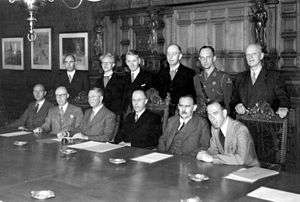 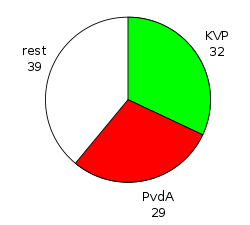 The first meeting of the First Beel cabinet on 3 July 1946 | |
| Date formed | 3 July 1946 |
| Date dissolved |
7 August 1948 (Demissionary from 7 July 1948) |
| People and organisations | |
| Head of state | Queen Wilhelmina |
| Head of government | Louis Beel |
| Deputy head of government | Willem Drees |
| No. of ministers | 17 |
| Ministers removed (Death/resignation/dismissal) | 5 |
| Total no. of ministers | 19 |
| Member party |
Catholic People's Party (KVP) Labour Party (PvdA) |
| Status in legislature | Grand coalition (Roman/Red) |
| Opposition party | Anti-Revolutionary Party |
| Opposition leader | Jan Schouten |
| History | |
| Election(s) | 1946 election |
| Outgoing election | 1948 election |
| Legislature term(s) | 1946–1948 |
| Incoming formation | 1946 formation |
| Outgoing formation | 1948 formation |
| Predecessor | Schermerhorn–Drees cabinet |
| Successor | Drees–Van Schaik cabinet |
![Azure, billetty Or a lion with a coronet Or armed and langued Gules holding in his dexter paw a sword Argent hilted Or and in the sinister paw seven arrows Argent pointed and bound together Or. [The seven arrows stand for the seven provinces of the Union of Utrecht.] The shield is crowned with the (Dutch) royal crown and supported by two lions Or armed and langued gules. They stand on a scroll Azure with the text (Or) "Je Maintiendrai" (French for "I will maintain".)](../I/m/State_coat_of_arms_of_the_Netherlands.svg.png) |
|---|
| This article is part of a series on the politics and government of the Netherlands |
|
Local government |
|
The First Beel cabinet was the cabinet of the Netherlands from 3 July 1946 until 7 August 1948/ The cabinet was formed by the political parties Catholic People's Party (KVP) and the Labour Party (PvdA) after the election of 1946. It was the first democratically elected cabinet formed after the end of World War II.The grand coalition (Roman/Red) cabinet was a majority cabinet in the House of Representatives.[1]
Term
A major issue was the independence of the Dutch East Indies. This required a change in the constitution. In November 1946 the Linggadjati Agreement was signed, but different interpretations led to Dutch military intervention (politionele acties). Under international pressure through the UN, this ended and negotiations restarted, ultimaltely resulting in the new country Indonesia, but only under the next cabinet, Drees I. An important new law was the 'Noodwet Ouderdomsvoorziening' by Deputy Prime Minister and Minister of Social Affairs Willem Drees.
Cabinet Members
| Ministers | Title/Ministry | Term of office | Party | |||
|---|---|---|---|---|---|---|
.jpg) |
Dr. Louis Beel (1902–1977) |
Prime Minister | 3 July 1946 – 7 August 1948 |
Catholic People's Party | ||
| General Affairs | 13 October 1947 – 7 August 1948 | |||||
| Minister | Interior | 23 February 1945 – 15 September 1947 [Retained] | ||||
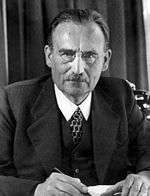 |
Willem Drees (1886–1988) |
Deputy Prime Minister / Minister |
Social Affairs | 25 June 1945 – 7 August 1948 [Retained] |
Labour Party | |
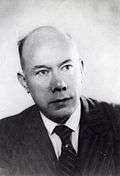 |
Dr. Piet Witteman (1892–1972) |
Minister | Interior | 15 September 1947 – 7 August 1948 |
Catholic People's Party | |
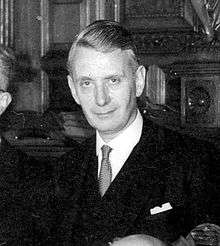 |
Baron Pim van Boetzelaer van Oosterhout (1892–1986) |
Minister | Foreign Affairs | 3 July 1946 – 7 August 1948 |
Independent Liberal (Conservative Liberal) | |
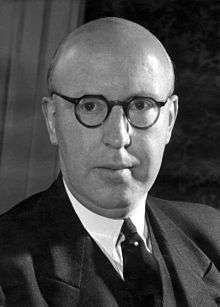 |
Dr. Piet Lieftinck (1902–1989) |
Minister | Finance | 25 June 1945 – 1 July 1952 [Retained] |
Labour Party | |
.jpg) |
Johan van Maarseveen (1894–1951) |
Minister | Justice | 3 July 1946 – 7 August 1948 |
Catholic People's Party | |
.jpg) |
Dr. Gerardus Huysmans (1902–1948) |
Minister | Economic Affairs | 3 July 1946 – 14 January 1948 [Res] |
Catholic People's Party | |
.jpg) |
Sicco Mansholt (1908–1995) |
14 January 1948 – 21 January 1948 [Ad interim] |
Labour Party | |||
 |
Dr. Jan van den Brink (1915–2006) |
21 January 1948 – 2 September 1952 |
Catholic People's Party | |||
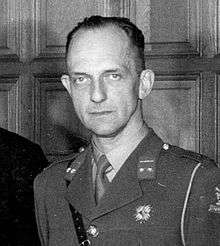 |
Lieutenant colonel Alexander Fiévez (1902–1949) |
Minister | War | 3 July 1946 – 7 August 1948 |
Catholic People's Party | |
| Navy | 3 July 1946 – 7 August 1946 [Ad interim] | |||||
| 25 November 1947 – 7 August 1948 | ||||||
.jpg) |
Jules Schagen van Leeuwen (1896–1976) |
7 August 1946 – 25 November 1947 [Res] |
Independent Conservative (Social Conservative) | |||
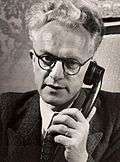 |
Dr. Jos Gielen (1898–1981) |
Minister | Education, Arts and Sciences |
3 July 1946 – 7 August 1948 |
Catholic People's Party | |
.jpg) |
Hein Vos (1903–1972) |
Minister | Transport | 3 July 1946 – 1 March 1947 |
Labour Party | |
| Transport and Water Management |
1 March 1947 – 7 August 1948 | |||||
.jpg) |
Sicco Mansholt (1908–1995) |
Minister | Agriculture, Fisheries and Food Supplies |
25 June 1945 – 1 January 1958 [Retained] |
Labour Party | |
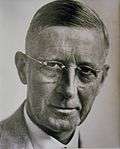 |
Dr. Johan Ringers (1885–1965) |
Minister | Public Works and Reconstruction |
25 June 1945 – 15 November 1946 [Retained] [Res] |
Independent Liberal (Classical Liberal) | |
.jpg) |
Hein Vos (1900–1972) |
15 November 1946 – 3 March 1947 [Ad interim] |
Labour Party | |||
.jpg) |
Lambertus Neher (1899–1967) |
Reconstruction and Housing |
3 March 1947 – 1 March 1948 [Res] |
Labour Party | ||
 |
Dr. Joris in 't Veld (1895–1981) |
1 March 1948 – 2 September 1952 |
Labour Party | |||
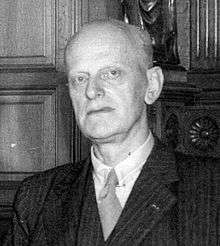 |
Jan Jonkman (1891–1976) |
Minister | Colonial Affairs | 3 July 1946 – 7 August 1948 |
Labour Party | |
| Ministers without portfolio | Title/Portfolio/Ministry | Term of office | Party | |||
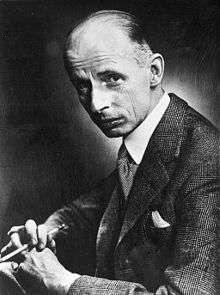 |
Eelco van Kleffens (1894–1983) |
Minister | United Nations Affairs (within Foreign Affairs) |
1 March 1946 – 1 July 1947 [Retained] [Res] |
Independent Liberal (Classical Liberal) | |
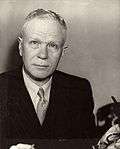 |
Lubbertus Götzen (1894–1979) |
Minister | Colonial Policy (within Colonial Affairs) |
11 November 1947 – 15 March 1951 |
Independent Christian Democrat (Protestant) | |
| Source: (in Dutch) Rijksoverheid | ||||||
- Retained Retained this position from the previous cabinet.
- Res Resigned.
- Ad interim Served ad interim.
References
- ↑ (in Dutch) "Coalities tussen sociaaldemocraten en confessionelen". Historisch Nieuwsblad. 10 August 2006. Retrieved 24 April 2018.
External links
- Official
- (in Dutch) Kabinet-Beel I Parlement & Politiek
- (in Dutch) Kabinet-Beel I Rijksoverheid
| Wikimedia Commons has media related to Cabinet Beel I. |